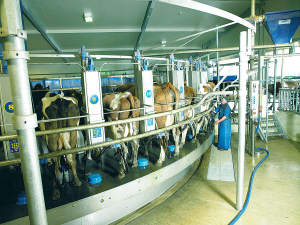Fonterra slashes forecast milk price, again
Fonterra has slashed another 50c off its milk price forecast as global milk flows shows no sign of easing.
 Dairy farmers are expected to continue to milk as long as they can to capitalise on a record milk price this season.
Dairy farmers are expected to continue to milk as long as they can to capitalise on a record milk price this season.
Dairy farmers will be milking cows for as long as they can to capitalise on a record milk price this season.
Soaring farm input costs may erode profit margins, but a milk price near $9/kgMS provides farmers the chance to boost income and reduce debt.
Fonterra chief executive Miles Hurrell says farmers around the globe are facing inflationary pressures and NZ is no exception.
"But I don't think there will be any adverse reaction to milk production," says Hurrell.
Hurrell points out that the co-operative's milk supply is down around 3% on this time last season.
However, improving weather conditions and forecast milk collections for the balance of this season are generally on par with last season.
Fonterra expects to collect 1,525 million kgMS this season, just shy of the 1,539 million kgMS collected last season.
Former Waikato Federated Farmers president Andrew McGiven agrees that if the current payout forecasts hold true, rising input costs will not affect milk production too much.
McGiven believes farmers will instead be keeping a close eye on the weather. "If it gets too dry over summer, farmers will continue to monitor rising feed input costs, along with cow condition to determing what will be their cut-off pint for milking," he told Rural News.
"Most I think will continue to milk for as long as possible to capitalise on the payout."
While feed, fertiliser and fuel prices are rising, McGiven believes the biggest concern for farmers will be the rebound in interest rates.
“That may have a significant impact on some farm’s profitability.
“Inflation is the profit stealer from any business and we are seeing this also on most products and inputs, from diesel and petrol through to wages and fertilisers.
“At the moment we are lucky to have a good forecast milk price to buffer us from most of these impacts.
“I am trying to pay down as much debt as possible, also being well aware that we will have another potentially large tax bill looming in the next financial year that we also need to budget for, so I am certainly hoping that these type of milk prices can be sustainable in the short to medium term.”
Earlier this month, Fonterra narrowed its forecast milk price range to $8.40 - $9/kgMS, with a midpoint of $8.70/ kgMS.
Updating its milk collection figures, the cooperative says season to date collection, June – October, was 510.9 million kgMS, 3.2% behind last season.
“Cold and wet spring with limited sunshine affected pasture growth and collections early in the season,” Fonterra said. “Full season forecast remains at 1,525 million kgMS, down 0.9% on last season – improving weather conditions and balance of this season’s collections being on par with last season supports current forecast.”
Global demand for dairy remains strong and Fonterra thinks that will remain the case for the short to medium term.
At the same, the cloud of Covid-19 and new emerging variants cast a shadow over global trade.
Hurrell says the co-op is working hard to deliver for farmers, unit holders and customers and supporting employees.
“The resilience of our people and our supply chain means we continue to stay on top of the strong demand for our New Zealand milk,” he says.
“However, it is concerning to hear about new variants, which are potentially more resistant to vaccines. There is also the ongoing question of whether economies can rebound from the pandemic and then sustain their financial health.”
Hurrell says that explains why the co-op has a 60-cent range on its forecast farmgate milk price range.
Legal controls on the movement of fruits and vegetables are now in place in Auckland’s Mt Roskill suburb, says Biosecurity New Zealand Commissioner North Mike Inglis.
Arable growers worried that some weeds in their crops may have developed herbicide resistance can now get the suspected plants tested for free.
Fruit growers and exporters are worried following the discovery of a male Queensland fruit fly in Auckland this week.
Dairy prices have jumped in the overnight Global Dairy Trade (GDT) auction, breaking a five-month negative streak.
Alliance Group chief executive Willie Wiese is leaving the company after three years in the role.
A booklet produced in 2025 by the Rotoiti 15 trust, Department of Conservation and Scion – now part of the Bioeconomy Science Institute – aims to help people identify insect pests and diseases.

OPINION: The release of the Natural Environment Bill and Planning Bill to replace the Resource Management Act is a red-letter day…
OPINION: Federated Farmers has launched a new campaign, swapping ‘The Twelve Days of Christmas’ for ‘The Twelve Pests of Christmas’ to…